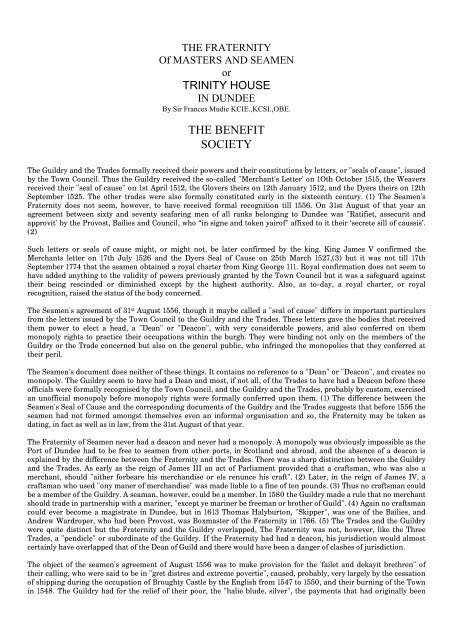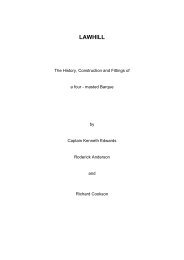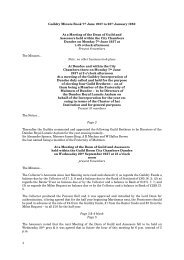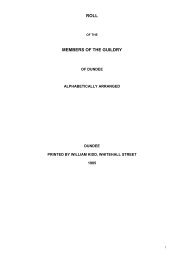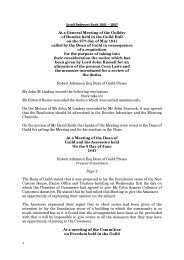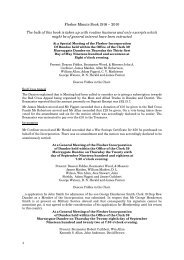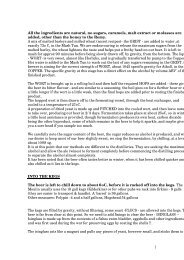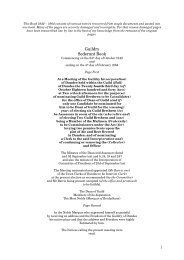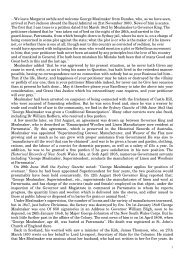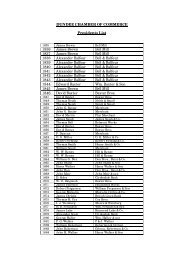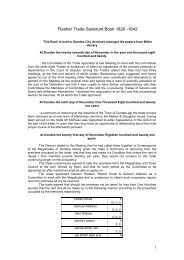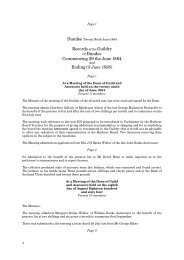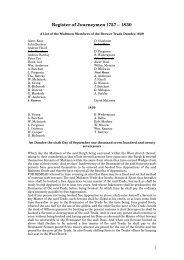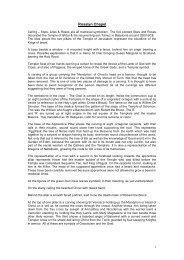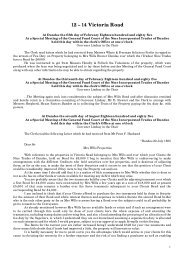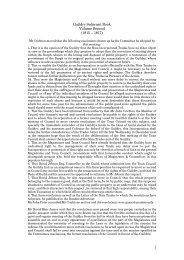THE BENEFIT SOCIETY - Nine Trades of Dundee
THE BENEFIT SOCIETY - Nine Trades of Dundee
THE BENEFIT SOCIETY - Nine Trades of Dundee
You also want an ePaper? Increase the reach of your titles
YUMPU automatically turns print PDFs into web optimized ePapers that Google loves.
<strong>THE</strong> FRATERNITY<br />
Of MASTERS AND SEAMEN<br />
or<br />
TRINITY HOUSE<br />
IN DUNDEE<br />
By Sir Frances Mudie KCIE.,KCSI.,OBE.<br />
<strong>THE</strong> <strong>BENEFIT</strong><br />
<strong>SOCIETY</strong><br />
The Guildry and the <strong>Trades</strong> formally received their powers and their constitutions by letters, or "seals <strong>of</strong> cause", issued<br />
by the Town Council. Thus the Guildry received the so-called "Merchant's Letter' on 1Oth October 1515, the Weavers<br />
received their "seal <strong>of</strong> cause" on 1st April 1512, the Glovers theirs on 12th January 1512, and the Dyers theirs on 12th<br />
September 1525. The other trades were also formally constituted early in the sixteenth century. (1) The Seamen's<br />
Fraternity does not seem, however, to have received formal recognition till 1556. On 31st August <strong>of</strong> that year an<br />
agreement between sixty and seventy seafaring men <strong>of</strong> all ranks belonging to <strong>Dundee</strong> was "Ratifiet, assecurit and<br />
approvit' by the Provost, Bailies and Council, who “in signe and token yair<strong>of</strong>" affixed to it their ‘secrete sill <strong>of</strong> caussis’.<br />
(2)<br />
Such letters or seals <strong>of</strong> cause might, or might not, be later confirmed by the king. King James V confirmed the<br />
Merchants letter on 17th July 1526 and the Dyers Seal <strong>of</strong> Cause on 25th March 1527,(3) but it was not till 17th<br />
September 1774 that the seamen obtained a royal charter from King George 111. Royal confirmation does not seem to<br />
have added anything to the validity <strong>of</strong> powers previously granted by the Town Council but it was a safeguard against<br />
their being rescinded or diminished except by the highest authority. Also, as to-day, a royal charter, or royal<br />
recognition, raised the status <strong>of</strong> the body concerned.<br />
The Seamen's agreement <strong>of</strong> 31 st August 1556, though it maybe called a "seal <strong>of</strong> cause" differs in important particulars<br />
from the letters issued by the Town Council to the Guildry and the <strong>Trades</strong>. These letters gave the bodies that received<br />
them power to elect a head, a "Dean" or "Deacon", with very considerable powers, and also conferred on them<br />
monopoly rights to practice their occupations within the burgh. They were binding not only on the members <strong>of</strong> the<br />
Guildry or the Trade concerned but also on the general public, who infringed the monopolies that they conferred at<br />
their peril.<br />
The Seamen's document does neither <strong>of</strong> these things. It contains no reference to a "Dean" or "Deacon", and creates no<br />
monopoly. The Guildry seem to have had a Dean and most, if not all, <strong>of</strong> the <strong>Trades</strong> to have had a Deacon before these<br />
<strong>of</strong>ficials were formally recognised by the Town Council, and the Guildry and the <strong>Trades</strong>, probably by custom, exercised<br />
an un<strong>of</strong>ficial monopoly before monopoly rights were formally conferred upon them. (1) The difference between the<br />
Seamen's Seal <strong>of</strong> Cause and the corresponding documents <strong>of</strong> the Guildry and the <strong>Trades</strong> suggests that before 1556 the<br />
seamen had not formed amongst themselves even an informal organisation and so, the Fraternity may be taken as<br />
dating, in fact as well as in law, from the 31st August <strong>of</strong> that year.<br />
The Fraternity <strong>of</strong> Seamen never had a deacon and never had a monopoly. A monopoly was obviously impossible as the<br />
Port <strong>of</strong> <strong>Dundee</strong> had to be free to seamen from other ports, in Scotland and abroad, and the absence <strong>of</strong> a deacon is<br />
explained by the difference between the Fraternity and the <strong>Trades</strong>. There was a sharp distinction between the Guildry<br />
and the <strong>Trades</strong>. As early as the reign <strong>of</strong> James III an act <strong>of</strong> Parliament provided that a craftsman, who was also a<br />
merchant, should "aither forbeare his merchandise or els renunce his craft". (2) Later, in the reign <strong>of</strong> James IV, a<br />
craftsman who used "ony maner <strong>of</strong> merchandise" was made liable to a fine <strong>of</strong> ten pounds. (3) Thus no craftsman could<br />
be a member <strong>of</strong> the Guildry. A seaman, however, could be a member. In 1580 the Guildry made a rule that no merchant<br />
should trade in partnership with a mariner, "except ye mariner be freeman or brother <strong>of</strong> Guild". (4) Again no craftsman<br />
could ever become a magistrate in <strong>Dundee</strong>, but in 1613 Thomas Halyburton, "Skipper", was one <strong>of</strong> the Bailies, and<br />
Andrew Wardroper, who had been Provost, was Boxmaster <strong>of</strong> the Fraternity in 1766. (5) The <strong>Trades</strong> and the Guildry<br />
were quite distinct but the Fraternity and the Guildry overlapped, The Fraternity was not, however, like the Three<br />
<strong>Trades</strong>, a "pendicle" or subordinate <strong>of</strong> the Guildry. If the Fraternity had had a deacon, his jurisdiction would almost<br />
certainly have overlapped that <strong>of</strong> the Dean <strong>of</strong> Guild and there would have been a danger <strong>of</strong> clashes <strong>of</strong> jurisdiction.<br />
The object <strong>of</strong> the seamen's agreement <strong>of</strong> August 1556 was to make provision for the 'failet and dekayit brethren" <strong>of</strong><br />
their calling, who were said to be in "gret distres and extreme povertie", caused, probably, very largely by the cessation<br />
<strong>of</strong> shipping during the occupation <strong>of</strong> Broughty Castle by the English from 1547 to 1550, and their burning <strong>of</strong> the Town<br />
in 1548. The Guildry had for the relief <strong>of</strong> their poor, the "halie blude, silver", the payments that had originally been
made for the upkeep <strong>of</strong> the altar <strong>of</strong> the Holy Blood in St. Mary's church, but which were used for the poor after the altar<br />
was abolished.<br />
The <strong>Trades</strong>, too, had their "pennies", contributed regularly for the upkeep <strong>of</strong> the altars <strong>of</strong> their patron saints, but later<br />
also devoted to poor relief. (2) The seamen, however, though the "grete negligence and ungodlie slouth" <strong>of</strong> their<br />
predecessors, had made no similar provisions with the result that their "depauperit" brethren were "vilipendit<br />
(slighted), neglectit and not regardit to the displeasure <strong>of</strong> Almighty God and their ruin.<br />
It was therefore agreed that each seaman should contribute, according to his rank, a certain amount <strong>of</strong> what he<br />
received for his outward voyage to a foreign country and another amount, in foreign currency, for the return journey.<br />
Ships going to a Scottish port were to contribute eighteen pence for each voyage, unless they brought coal, in which<br />
case they were to contribute ‘ ane creill full <strong>of</strong> coillis’. The master <strong>of</strong> the ship was responsible for collecting all these<br />
contributions and for paying them after, presumably, realising the price <strong>of</strong> the coal, into a box which was to be "lokkit<br />
with four sundry keys" in the possession <strong>of</strong> "four marynaris". This box was to be kept by a "responsible maister or<br />
marynare within the burgh", who was to be changed each year on the Feast <strong>of</strong> the Nativity <strong>of</strong> Our Lady, "callit ye letter<br />
fair <strong>of</strong> Dundie (8th September), after its contents had been counted and the keeper's accounts audited. The money in<br />
the box was to be spent on the "sustentatioun and uphalding <strong>of</strong> the dekeyt brothir <strong>of</strong> ye saidis occupation or on ony<br />
uthir godlie way as salbe thocht maist expedient".<br />
Every ‘maister or pylot’ (1) setting out on a foreign voyage, had to pay to the box eighteen pence Scots "<strong>of</strong> his half hyre<br />
ressavit at hame" and an amount in foreign currency for his return voyage. It would appear, therefore, that seamen<br />
were paid for the return voyage in the foreign port and in foreign currency. This would be convenient as foreign money<br />
would be available from the sale <strong>of</strong> goods exported from Scotland. Foreign currency, too, was readily accepted in<br />
<strong>Dundee</strong>, as we know from the "compt buik <strong>of</strong> David Wedderburn", and was in demand by merchants wishing to import<br />
goods from abroad. Payment in foreign currency would, therefore, in no way embarrass the keeper <strong>of</strong> the seamen's box.<br />
The amounts payable in foreign currency depended, naturally, on the ports at which they were made. In France,<br />
Brittany, Flanders or Spain, or any westward port, the amount was three sous or three stucis. In Sweden, Denmark or<br />
any eastern port it was three lubeck shillings, or three gross. In Norway it was 12pence Scots and in England<br />
threepence "striviling" (sterling). Presumably, therefore, an English penny, a sous, a stuc and a lubeck shilling were all<br />
<strong>of</strong> equal value and each equalled four pennies Scots. Presumably, too, Scots currency was available in Norway, and<br />
Norwegian currency, if there was any, was not accepted in Scotland.<br />
"Dallsmen" or "dailsmen" paid two thirds <strong>of</strong> these amounts, ordinary seamen - "marynares" - paid one third and<br />
"putzears" or "half-men" paid half <strong>of</strong> what mariners paid. A "dailsman" was probably a mate. Jamieson, in his Scottish<br />
dictionary, gives "dail" or "deal" as meaning a part or portion, so "dailsman" would have almost exactly the original<br />
meaning <strong>of</strong> mate. A 11 puitear" or "half-man" may have been an apprentice or an unskilled seaman. There can hardly<br />
have been a place for a half-timer on board ship. (a)<br />
This agreement was signed by individual seamen and also by the crews <strong>of</strong> seven ships, "Anzell", "Petar", "Stewert”,<br />
"James" and three others, whose names are illegible. The "James" was probably the ship <strong>of</strong> that name which was later<br />
sent in pursuit <strong>of</strong> Bothwell, when he fled to Orkney after the Battle <strong>of</strong> Carberry Hill in 1567.<br />
On 3rd November 1562 this agreement was confirmed, with an additional clause binding any master who hired a<br />
mariner, who was not an inhabitant <strong>of</strong> <strong>Dundee</strong>, to pay to the box six pennies Scots, or one sou, or one lubeck shilling,<br />
in addition to the amount due under the agreement <strong>of</strong> 1556. The rate <strong>of</strong> exchange suggests that the Scots penny had in<br />
six years depreciated by 33 1/3 , per cent but it may have been overvalued in the original agreement.<br />
The value <strong>of</strong> the Scots currency had further deteriorated by 1576. when a French sou, a Flanders stuire (?stuc) and a<br />
Danish gross were each worth twelve pennies Scots. (1) Figures for the value <strong>of</strong> Scots currency in gold, given on p.4 <strong>of</strong><br />
Boases "Century <strong>of</strong> Banking in <strong>Dundee</strong>", show that this was a period <strong>of</strong> rapid depreciation <strong>of</strong> the currency, though<br />
hardly as rapid as the comparison <strong>of</strong> the value <strong>of</strong> Scots pennies in terms <strong>of</strong> foreign currency would seem to indicate.<br />
Measured in gold the Scots currency depreciated by about 25 per cent between 1556 and 1577. It continued to<br />
depreciate in terms <strong>of</strong> gold and by 1601 its value was only one third <strong>of</strong> what it had been in 1556, when the seamen's<br />
agreement was drawn up.<br />
This rapid depreciation eventually led to the breakdown <strong>of</strong> the system <strong>of</strong> financing poor relief by the payments agreed<br />
in 1556, but before describing the changes that were made in that system, it is worth while digressing to describe a<br />
document in the possession <strong>of</strong> the Fraternity, Appendix 11, which, though it does not mention the Fraternity, throws<br />
considerable light on seafaring conditions towards the end <strong>of</strong> the sixteenth century. The document is dated 1st October<br />
1582, and is the oldest document in the Fraternity's possession, except the agreement <strong>of</strong> 1556. It is a decree by the<br />
Head Court in <strong>Dundee</strong>, dealing with losses suffered by merchants by reason <strong>of</strong> piracy on the high seas. It was left to the<br />
option <strong>of</strong> the merchant to decide whether the loss <strong>of</strong> cargo and damage to the ship was to be a charge on the whole<br />
cargo or on the ship, except when the ship was returning home from Flanders with Flanders goods or from Dieppe or
Newhaven with goods from Rouen or Paris, when there was, for some unexplained reason, to be no charge on the ship<br />
itself. If a merchant lost any <strong>of</strong> his armour or weapons, the loss was to be a charge both on the cargo and on the ship. So<br />
also was the cost <strong>of</strong> treatment <strong>of</strong> any merchant who was "hurt or wounditt in defens <strong>of</strong> ye schip and guidis". The Head<br />
Court was the highest law-making authority <strong>of</strong> the Town and consisted <strong>of</strong> the Provost, the Dean <strong>of</strong> Guild, the members<br />
<strong>of</strong> the Town Council and the convenors <strong>of</strong> the <strong>Nine</strong> <strong>Trades</strong>.<br />
In 1607, a large number <strong>of</strong> seamen af all ranks, "maisteris <strong>of</strong> schipis, pylottis, dealsmen, schipwritis. maryneris and<br />
utheris", entered into afresh agreement raising the contributions provided for in the 1556 agreement by 50 per cent,<br />
except that the payment for a voyage to a Scottish port was raised from one shilling and sixpence to three shillings and<br />
four pence, and the increase in the amounts paid for voyages from England and Norway were increased by more than<br />
50 per cent. It was also agreed that 40 shillings Scots should be paid into the poor box for every apprentice engaged<br />
and that any master failing, on return to <strong>Dundee</strong>, to pay the contributions due for himself and his crew for the outward<br />
and homeward voyages should be fined forty shillings.<br />
In this agreement the distressed state <strong>of</strong> certain seamen is ascribed to "schipwrak, seikness, weiris,<br />
misgovernment and accidentis common to all men" and, so, provision had to be made for them and their "wyffis and<br />
bairnes". The <strong>of</strong>ficial afterwards known as the "box master" is in it referred to as the "collector".<br />
Perhaps because the Fraternity found difficulty in collecting these enhanced amounts they approached the Bailies to<br />
have the new agreement ratified by them and on 17th March 1609 Bailies Goldman and Clayhills ordered it to be<br />
inscibed and registered in the common Court Books <strong>of</strong> <strong>Dundee</strong>, which seems to have had the effect <strong>of</strong> making it<br />
enforceable by horning (outlawry) and "poynding" (distraint <strong>of</strong> goods). Later in the same year, on 16th June, letters <strong>of</strong><br />
arrestment were issued by King James VI at the instance <strong>of</strong> "David Smart, skipper, burgess <strong>of</strong> our Burgh <strong>of</strong> Dundie,<br />
Collector appoyntit for "uplifting" the payments due from seamen.<br />
Four years later further steps were taken to increase the poors fund. On 9th February, 1613, the Provost, Bailies and<br />
Council, with the consent <strong>of</strong> the Ship-Masters <strong>of</strong> the Burgh, decided (2) that, as was the custom in these parts, all<br />
mariners who were not burgesses or inhabitants <strong>of</strong> <strong>Dundee</strong> and who were hired for a voyage, either to or from <strong>Dundee</strong>,<br />
should pay six shillings Scots to the "marineris box" as "pryrngit.<br />
Six months later on 4th August, at the request <strong>of</strong> Bailie Thomas Halyburtoun, Skipper, and two other mariner<br />
members <strong>of</strong> the Town Council, the Bailies and Council made an order confirming a resolution <strong>of</strong> the seamen that in<br />
future the ship masters should pay to the box the "haill pryrngilt which they had been receiving in goods arriving or<br />
leaving the port in <strong>Dundee</strong> ships and also "the bignes heidis <strong>of</strong> all girnell (granary) guides... extending to ane barrell<br />
befoir ye mast and ane barrell behind ye mast". The meaning <strong>of</strong> the document is obscure. It is not clear why, as appears<br />
to have been the case, the ship masters should have received primgilt. The reference to "girnell guides" presumably<br />
applied only to ships carrying grain, but the meaning <strong>of</strong> "bigness heidis" has not been ascertained..<br />
The enhanced contributions seem to have been adequate for the relief <strong>of</strong> the Fraternity's Poor, though in 1621,1644,<br />
1691 and 1699 resource had to be had to the courts to enforce their payment. In 1699 one <strong>of</strong> these who refused to pay<br />
was James Fletcher, a former Provost and Member <strong>of</strong> Parliament for the Burgh, who had been the main defender <strong>of</strong> the<br />
rights <strong>of</strong> the Council against Claverhouse. (1)<br />
Prices did not rise so sharply in the seventeenth century as they had done in the last quarter <strong>of</strong> the sixteenth, but they<br />
did continue to rise and the Fraternity would probably have had, sooner or later, to increase their poor relief<br />
contributions, if they had not received a large income from another source.<br />
LIGHTING AND<br />
BUOYING AUTHORITY<br />
For the first one hundred and thirty years <strong>of</strong> its existence the Fraternity appears to have been purely a benefit society<br />
and to have performed no public function. Its character was, however, completely changed in 1687, when, on the 24th<br />
February <strong>of</strong> that year, the Privy Council at the instance <strong>of</strong> the "Masters and Seamen" <strong>of</strong> <strong>Dundee</strong> empowered the<br />
Fraternity to charge certain dues on shipping on the Tay in return for their undertaking to light the entrance to the<br />
river. No copy <strong>of</strong> the Privy Council's decree is to be found among the Fraternity's papers, or in the records <strong>of</strong> the Privy<br />
Council. There is, however, a copy in the Town Council's records, which has been printed on pp. 111- 113 <strong>of</strong> Hay's<br />
"Charters and Documents Relating to the Burgh <strong>of</strong> <strong>Dundee</strong>".<br />
The Fraternity's request to the Privy Council states that 1he River and Firth <strong>of</strong> Tay, having a narrow entry between two<br />
dangerous Banks, has in all time by-past been unnavigate and without the assistance <strong>of</strong> lights and beacons to the great
prejudice <strong>of</strong> Trade, Ruine and Loss <strong>of</strong> Men's Lives (as by sad experience is well known within these Five Years<br />
by-past)".<br />
“An exact Plate and accurate Description" <strong>of</strong> the river had however recently been made by John Adair, and this enabled<br />
the river to be entered without hazard by Day-light, but under Night the best experienced seaman, not daring to<br />
attempt the same, are <strong>of</strong>t times put to sea, or continued to turn all Night with great hazard in the outward Bay<br />
(strangers ordinarily running ashoar and losing all)". The curious thing is that John Adair's map <strong>of</strong> the entrance to the<br />
Tay, which the Fraternity themselves refer to, clearly shows "lights" on Buddon Ness. Perhaps they were ineffective or,<br />
perhaps, the Fraternity wanted to strengthen their case for the tonnage due which the Privy Council granted them.<br />
There appear to have been lights on Buddon Ness as early as 1660. (1)<br />
To remedy this dangerous state <strong>of</strong> affairs the Fraternity proposed to the Privy Council that they should be given the<br />
right to erect and maintain "One Light or Two upon the Buddon-Ness" and, in return, collect “Twelve Pennies Scots for<br />
each tun <strong>of</strong> all Ships, Barks and other Vessels coming within the Tay". Before passing orders the Privy Council<br />
consulted the Earl <strong>of</strong> Panmure "in so far as concerned his interest". The Earl consented and the Magistrates and Town<br />
Council supported the Fraternity. The Privy Council, accordingly, decreed that the Fraternity, or its Box-Master, should<br />
be entitled to uplift Twelve pennies Scots each voyage for each tun, in outcoming or incoming, for all the Ships, Barks,<br />
or other vessels coming into the said Firth, or River <strong>of</strong> Tay, viz. betwixt Fifeness and the Reidhead inclusive, forraigners<br />
paying double the said Duty". In return the Fraternity were to undertake to erect one or two lights on Buddon Ness,<br />
and "to keep up and maintain the same in the same Form and Dyet as the Lights <strong>of</strong> May". The document in which the<br />
Fraternity undertook this obligation is still among the Fraternity's papers.<br />
The Earl <strong>of</strong> Panmure was probably consulted by the Privy Council because the Buddon Ness light houses would be built<br />
on his property, but he may also have been consulted in his capacity as Admiral Depute <strong>of</strong> the Tay between "the South<br />
Water (?South Esk) and Bruchtie", a post to which one <strong>of</strong> his ancestors Patrick Maule, first Earl <strong>of</strong> Pammure, had been<br />
appointed on lst May 1635. (1) This appointment was probably the start <strong>of</strong> the long connexion between the Maule<br />
family and the Fraternity.<br />
The Town Council <strong>of</strong> <strong>Dundee</strong> would naturally be interested in the lighting <strong>of</strong> the entrance to the Tay, from the point <strong>of</strong><br />
view <strong>of</strong> the trade <strong>of</strong> the Burgh, but they were also interested in the navigation <strong>of</strong> the river as, by a commission dated<br />
21st August 1641, the Provost and Bailies had been appointed Admirals-Depute <strong>of</strong> the Tay "Fera Bruchtie on the north<br />
side <strong>of</strong> the Water <strong>of</strong> Tay and the Fferrie-partin-Craig on the south side yair<strong>of</strong>, westward to the Burgh <strong>of</strong> Perth. (2) The<br />
Council had, moreover, for a hundred years been responsible for the buoying <strong>of</strong> the river. In a charter signed by James<br />
VI but dated only “158-" it is set forth that the Provost, Bailies and Council <strong>of</strong> <strong>Dundee</strong> "upoun thair grete charges and<br />
expenses” had inbrocht within this realme, fra forane nationis ane greet numer <strong>of</strong> twnis (large casks) and meathes<br />
(marks or landmarks)" which were to be placed at the mouth <strong>of</strong> the river, in order that there should be a "suir passage<br />
alsweill for pepil as for shipping, boits and guidis".<br />
To help in this work, and in order that it might be 'Finished and outred”, the king granted to the Council the right to<br />
collect "on ilk twn <strong>of</strong> guidis imported be sey within the said river <strong>of</strong> Tay twelf pennyis at the incoming and at the<br />
laidnyng and outganging twelf pennies". (1) The right to collect these dues was confirmed by James by charter dated<br />
16th January 1601, (2) and again confirmed by Charles 1 in the charter which he granted to the town on 14th<br />
September 1641. (3) In these two latter charters it was laid down that buoys should be placed in the "Gaw <strong>of</strong> Barrie"<br />
and the Drumlay Sands".<br />
It is not clear whether the dues that the Fraternity were empowered to collect for lighting the river were in addition to<br />
those to which the Town Council were entitled for buoying it. It would appear however that the Council had ceased to<br />
buoy the Tay. Possibly they never started it again after the sack <strong>of</strong> the town by Monk. At any rate, according to the<br />
Guildry records, in 1711 it was reported "that the fraternity have visited their lighthouses in Tay and that they were<br />
decaying, and they, finding it more to the advantage <strong>of</strong> the trade that the river be buoyed than the light be keepit up,<br />
and therefor are to apply to Provost Yeaman (4) to petition the Parliament to have the same imposition presently paid<br />
to the lights to be payed by Act <strong>of</strong> Parliament for the saids boys".<br />
The Guildry approved <strong>of</strong> this proposal and the Fraternity took some <strong>of</strong> its members to "visit the banks to see how many<br />
boys are necessar". (5) The result <strong>of</strong> the petition is not known. The Fraternity presumably continued to maintain their<br />
lighthouses; they, probably, also buoyed the river, as in 1737 we find the Town Council agreeing to their receiving one<br />
half penny sterling (six pennies Scots) "over and above all dues already paid", to cover the cost <strong>of</strong> acquiring and<br />
maintaining "two Boys already bought from London for the better navigating <strong>of</strong> the River <strong>of</strong> Tay". (6) Certainly early in<br />
the nineteenth century the Fraternity was the authority responsible for both the lighting and buoying <strong>of</strong> the river.<br />
A word must be said about John Adair, whose "exact Plate and accurate Description" enabled the Tay to be safely<br />
navigated, at least by day. He was a distinguished Scottish surveyor and map maker. In 1686 Parliament passed an Act<br />
ordaining that "one shilling Scots be exacted out <strong>of</strong> ilke tun from all ships and other vessels above eight tuns within the
Kingdom (except Lighters and fishing boats), and two shilling Scots out <strong>of</strong> each forreigne ship yearly for the space <strong>of</strong><br />
five years", and that the proceeds should be paid to John Adair who had "given notable experiments <strong>of</strong> his great skill<br />
and diligence". In 1688 Adair was made a Fellow <strong>of</strong> the Royal Society and in 1703 he published a "Description <strong>of</strong> the<br />
Sea Coasts and Islands <strong>of</strong> Scotland with Large and Exact Maps for the use <strong>of</strong> Seamen", which contained a map <strong>of</strong> "The<br />
Tay River and Firth from Fifeness to Redhead". He died in London in 1722.<br />
<strong>THE</strong> ROYAL CHARTER<br />
During the eighteenth century the prosperity <strong>of</strong> <strong>Dundee</strong> steadily increased, though it was not till after the 'Forty-Five<br />
that the town fully recovered from its sack by Monk in 1651. Shipping naturally prospered with the town. In 1690 there<br />
were in the harbour 21 vessels totalling 1091 tons: in 1731 there were 70 vessels totalling 2309 tons and in 1792 there<br />
were 116 vessels totalling 8550 tons, (1) The status <strong>of</strong> the Fraternity is seen by the fact that Andrew Wardroper, who<br />
was Provost in 1753-54 and again in 1757-58, was Box-master in 1766. (2)<br />
As a mark <strong>of</strong> its standing and to increase its status King George III granted the Fraternity a charter on 17th September<br />
1774. It is in Latin and mostly taken up with regulations governing the holdings <strong>of</strong> meetings, the election <strong>of</strong> the<br />
Box-master and the Committee, the admission <strong>of</strong> members, financial matters and the payment <strong>of</strong> pensions to "decayed<br />
and reduced members... and their widows" and certain relatives "in reduced circumstances". Those provisions were<br />
presumably there in force when the Charter was granted and their inclusion in it was, presumably, designed to insure<br />
that they could be altered only with very great difficulty. Indeed, they are in force to this day. As regards other matters<br />
the Fraternity was given power to make by-laws in accordance with the tenor <strong>of</strong> the Charter.<br />
The Charter seems to make it clear that by the time that it was granted the system <strong>of</strong> raising money for the poor <strong>of</strong> the<br />
pr<strong>of</strong>ession had ceased to be that laid down in 1556 and subsequent agreements. Instead a system <strong>of</strong> yearly<br />
contributions had been introduced.<br />
One curious provision <strong>of</strong> the Charter prohibits the Fraternity investing in land, tenements and other hereditments" the<br />
yearly rent <strong>of</strong> which exceeded five hundred pounds, "computing rents as they stood at the time <strong>of</strong> purchase", after<br />
deducting "few duties, land tax, ministers stipends and other public burdens". On 17th April 1750 the Fraternity had<br />
bought West Horn, a farm in the parish <strong>of</strong> Errol from George Brown, a grandson <strong>of</strong> the George Brown who was Provost<br />
<strong>of</strong> <strong>Dundee</strong> in 1667-68 and again from 1672 to 1677, and who so courageously stood up for the town's rights against the<br />
Constable Charles Maitland <strong>of</strong> Hatton.<br />
Perhaps experience had shown that investment in land had its drawbacks. West Horn remained in the possession <strong>of</strong><br />
the Fraternity fill 10th November, 1876, when it was sold for £2,500 cash and £7,000 on mortgage to Archibald Taylor<br />
<strong>of</strong> Edinburgh. There was, <strong>of</strong> course, no limit to the amount that the Fraternity could invest in other ways. Indeed it was<br />
provided that the estates and capital sums which compose the funds <strong>of</strong> the said Corporation shall forever hereafter<br />
remain entire and untouched for the beho<strong>of</strong> there<strong>of</strong>'. To spend the Fraternity's capital would thus require an<br />
amendment to the Charter.<br />
The Charter confirmed the right <strong>of</strong> the Fraternity to "erect Lights and Beacons at the entry <strong>of</strong> the River, or Firth, <strong>of</strong> Tay,<br />
and to levy and exact on account <strong>of</strong> these Lights, a duty <strong>of</strong> twelve pennies Scots, or one penny Sterling, for every Ton <strong>of</strong><br />
all the ships and other vessels either coming out, or going into, the River and Firth <strong>of</strong> Tay, between Fifeness and the<br />
Redhead inclusive, and to levy and exact the double <strong>of</strong> the said duty for Foreigners". No mention is made <strong>of</strong> buoying<br />
the Tay, or <strong>of</strong> the collection <strong>of</strong> any buoying dues. Perhaps, therefore, the duty <strong>of</strong> one half penny Sterling per ton which<br />
the Town Council had agreed to in 1737 was, by this time, no longer collected. On the other hand, neither is there any<br />
mention in the Charter <strong>of</strong> the right <strong>of</strong> the Fraternity to collect, in addition to the light dues, two pence sterling on each<br />
chalder (1) <strong>of</strong> Scots coal imported into <strong>Dundee</strong>. The Fraternity's right to do this was proved in the case <strong>of</strong> the Fraternity<br />
v. Andrew Dempster in 1829. The Town Council took ten and two-third pence per chalder, the Church and the Hospital<br />
two pence per chalder each. This charge is reminiscent <strong>of</strong> the "creill full <strong>of</strong> coillis" mentioned in the agreement <strong>of</strong> 1556.<br />
But that agreement applied only to members <strong>of</strong> the Fraternity and not to the general public. TheCharter neither<br />
conferred new rights on the Fraternity, nor deprived it <strong>of</strong> existing rights. It merely, in these matters, reflected the<br />
provisions <strong>of</strong> the Privy Council decree <strong>of</strong> 1687, to which the Crown was already consulted.<br />
(1) A chalder was a measure <strong>of</strong> capacity equal to 16 bols: the bol decremed between 1780 and 1820 From 8, stone to 6<br />
stone: so in the same period, the chalder decrerned from 6.4 tons to 4.8 tons and the levy per ton increased by<br />
33 1/3 per cent.<br />
The names <strong>of</strong> the Masters <strong>of</strong> the Fraternity are given in the Charter. There were thirty four <strong>of</strong> them. The Box-master<br />
was David MyIes. It also appears from the Charter that the Fraternity paid a salary to a "public teacher <strong>of</strong><br />
Mathematics" in <strong>Dundee</strong> and part <strong>of</strong> the stipend <strong>of</strong> the Ministers <strong>of</strong> the town. The contribution to the Minister's<br />
stipend was <strong>of</strong> very old standing, at least since 1624, when, in a minute <strong>of</strong> the Town Council <strong>of</strong> 29th July, the Minister's<br />
stipend <strong>of</strong> 800 merks was to be paid as to 500 merks from Burgh funds and as to 300 merks from Hospital funds. To
the latter sum the Guildry was to contribute 60 merks, the crafts 52 merks, the Seamen 30 merks, the Malters 30<br />
merks and the Litsters 12 merks. (1)<br />
TRINITY HOUSE<br />
The prosperity <strong>of</strong> the Fraternity towards the end <strong>of</strong> the eighteenth century is further shown by their building <strong>of</strong> Trinity<br />
House in 1790. Previously they had had a meeting place near the Craig Pier. The architect <strong>of</strong> this new building was<br />
Samuel Bell, a Dundonian, whose best known work is St. Andrew's Church. It was situated on the south side <strong>of</strong><br />
Yeaman's Shore at its junction with South Union Street. The ground floor was used as a School <strong>of</strong> Navigation during<br />
the week and a Mariners Church on Sundays. The Fraternity's Hall was on the first floor. The following description <strong>of</strong> it<br />
was written early in the next century: "It is a plain building and holds rather an indifferent situation. It contains a large<br />
room for general meetings and smaller ones for preserving records, besides a very convenient house on the second<br />
story for the <strong>of</strong>ficer, who is always a respectable member <strong>of</strong> the Fraternity, though perhaps not so fortunate in the<br />
world as his brethren".<br />
For exactly a hundred years Trinity House was the headquarters <strong>of</strong> the Fraternity. Its hall contained models <strong>of</strong> ships,<br />
pictures <strong>of</strong> the various lighthouses that they had erected and portraits <strong>of</strong> people <strong>of</strong> distinction and <strong>of</strong> interest to the<br />
Fraternity. Mr Charles W. Boase in 1843 presented them with a copy <strong>of</strong> Hoppner's portrait <strong>of</strong> Admiral Duncan and in<br />
1855 engravings <strong>of</strong> the first and second Lords Panmure and <strong>of</strong> George Duncan M.P. <strong>of</strong> the time were hung in Trinity<br />
House "with the usual inscription". In 1843 the first Lord Panmure presented to the Fraternity the portraits <strong>of</strong> Grace<br />
Darling and her father William Darling, which have now been lent to the Albert Institute Art Gallery. His son, Fox<br />
Maule, afterwards second Lord Panmure and eleventh Earl <strong>of</strong> Dalhousie, was also a patron <strong>of</strong> the Fraternity. When he<br />
and his lady visited Trinity House in September 1850 they apparently found it very dirty and, presumably, said so, as<br />
the committee resolved that "in future no fowls should be allowed to be kept and no clothes be allowed to be dried<br />
within the premises, except those <strong>of</strong> the <strong>of</strong>ficer's own family". The <strong>of</strong>ficer was also "directed to see that the furniture in<br />
the Hall and Committee Room, is dusted daily". Fox Maule may have caught the <strong>of</strong>ficer out in a temporary lapse as<br />
regards dusting, but the fowls take some explaining away.<br />
Trinity House was occasionally allowed to be used by outsiders, but only for purposes in which the Fraternity was<br />
interested. In February 1849 the Joint Committee <strong>of</strong> the subscibers to the Royal Arch and <strong>of</strong> the Harbour Trustees<br />
were allowed to show the competitive plans for the Arch in the hall, but two years later permission to show similar<br />
plans for the new Royal Infirmary was refused. Gas lighting was installed in April 1849, and the Committee resolved to<br />
purchase a suitable "lustre". Water-borne sanitation was introduced in December 1855.<br />
<strong>THE</strong> NINETEENTH CENTURY<br />
The writer whose description <strong>of</strong> Trinity House has already been quoted has this to say about the Fraternity itself at the<br />
beginning <strong>of</strong> the <strong>Nine</strong>teenth century: "From the respectability <strong>of</strong> the Seamen's Fraternity the Box-Master is necessarily<br />
a member <strong>of</strong> all the public institutes. Indeed, this is one <strong>of</strong> the most honourable and praiseworthy institutes <strong>of</strong> the<br />
town, and reflects great honour on that class <strong>of</strong> men who lead such a precarious life. They invariably pay with great<br />
cheerfulness the small tax imposed on their wages for the purpose <strong>of</strong> supporting their old and disabled brethren, not<br />
knowing but they themselves, in the course <strong>of</strong> Providence, may one day be thankful for the benefits arising from the<br />
trifle shared from their income under more happy auspices".<br />
Fortunately the Minute Book covering the meetings <strong>of</strong> the Fraternity and <strong>of</strong> the Committee from 30th December 1848<br />
to 5th October 1860 has survived, and so we are able to form a fairly clear picture <strong>of</strong> the Fraternity's activities in the<br />
middle <strong>of</strong> the century when they were probably at their height. Meetings were regularly held on the dates laid down in<br />
the Charter. Boxmasters generally held <strong>of</strong>fice for two consecutive years, and frequently, on demitting <strong>of</strong>fice, became<br />
their successors' deputies. One <strong>of</strong> them, John Kennedy, who had been Box-master for a total period <strong>of</strong> six years, died<br />
on 9th January 1857 in Christian Sand in Norway, where he had gone "in the discharge <strong>of</strong> his duty as Surveyor for the<br />
Union Association <strong>of</strong> Underwriters". The Fraternity was in close touch with the Admiralty and all the Members <strong>of</strong><br />
Parliament for the Town, and was frequently consulted on Bills coming from Parliament.<br />
The main business <strong>of</strong> the Fraternity was the lighting and buoying <strong>of</strong> the Tay, in all matters concerning which their main<br />
advisers were Messrs Stevenson <strong>of</strong> Edinburgh. The lighthouses at Buddon Ness were, <strong>of</strong> course, in existence long<br />
before the beginning <strong>of</strong> the century, but the <strong>Nine</strong>teenth century saw great improvements in the lighting and buoying <strong>of</strong><br />
the Tay. The Fraternity possessed a yacht, in which the Box-master and the members <strong>of</strong> the committee inspected the<br />
buoys once a month. This yacht also replaced the pilot cutter when it was being overhauled, and was used for the<br />
"annual excursion", which theFraternity gave to the Harbour Trustees. It also functioned as starter at the Newport and<br />
Broughty Ferry regattas.
The Royal Commission on Lighthouses, Buoys and Beacons issued a questionnaire in 1859. The Fraternity's draft<br />
answers were entered in the back <strong>of</strong> the Minute Book and from these the following information about the lighting and<br />
buoying <strong>of</strong> the Tay has been taken.<br />
The "High Light at Buddon Ness "had two fixed lights, one showing eastward and one westward in the same lantern"<br />
and the "Lower Ligliht had "one light showing eastward". In July, 1849, after consultation with Messrs Stevenson, it<br />
was decided to paint a black stripe on each <strong>of</strong> the Buddon Ness lighthouses to "make them better distinguished when<br />
there was snow on the ground". This did not, however, prove a success, and in 1852 the black stripes were removed and<br />
the lighthouses repainted all white. The High Light was manned by a keeper on a salary <strong>of</strong> £60 a year, with house,<br />
garden, coal, light and uniform. The keeper <strong>of</strong> the Lower Light was paid £40 a year, with coal and light.<br />
There were also two lighthouses at "Ferry Port-on-Craig", an "upperlight and a 1ower light". The former is reported to<br />
have been built by John Hamilton, builder, in 1823. The use <strong>of</strong> the latter was discontinued when the Pile Light was<br />
constructed, but it was kept in "proper working order". so that if anything happened to the Pile Light it could be<br />
"lighted at a moment's notice". The Pile Light was built in 1848 by Thomas Barker, builder, Perth, and the lightroom by<br />
James Milne & Sons, Brassfounders, Edinburgh. It was proposed at first to insure the Pile Light against fire for £1000,<br />
but when it was found that this could not be done at a rate as low as 7/6 per cent, it was resolved to insure for only<br />
£500. No insurance could be effected against collision. The two lighthouses and the Pile Light were maintained by<br />
three keepers, assisted by the members <strong>of</strong> their families. The first keeper received £55 per annum, the second £40, and<br />
the third £32, "with free houses, gardens, coals and light".<br />
The Lucky Scaup beacon was erected in 1853. In February <strong>of</strong> that year the Fraternity wrote to Captain Maltland<br />
Dougall, proprietor <strong>of</strong> Scotseraig, asking him either to repair the "house" on Lucky Scaup or allow the Fraternity to<br />
erect a beacon on its site. There is no indication <strong>of</strong> what sort <strong>of</strong> house this was, but, as it seems to have been considered<br />
an alternative to a beacon, perhaps it was some kind <strong>of</strong> a private lighthouse. Captain Maitland Dougall agreed to the<br />
erection <strong>of</strong> a beacon, provided that he received a reasonable price for the materials <strong>of</strong> the old house. Eventually £5 was<br />
paid for the old building and a feu duty <strong>of</strong> sixpence a year agreed on for the site. The beacon itself was built by John<br />
Kidd <strong>of</strong> Ferry-port-on-Craig at a cost <strong>of</strong> £51.10/-.<br />
The return made to the Royal Commission shows that in 1859 there were thirteen buoys in the Tay. They were coloured<br />
black on the port side and red on the starboard side. Before March 1858, however, the right hand side <strong>of</strong> the buoys,<br />
going up the Tay, had been "chequered". (a)<br />
The Fraternity was concerned with the navigation <strong>of</strong> the river in other ways also. It was the original licensing authority<br />
for pilots and was the examining body for Masters and Mates certificates, when voluntary examinations were first<br />
introduced in 1845. The <strong>Dundee</strong> Harbour Act <strong>of</strong> 1843 transferred the functions <strong>of</strong> licensing and appointing pilots to the<br />
Harbour Trustees. The pilot vessels remained, however, under the control <strong>of</strong> the Fraternity and they had to be<br />
equipped to the Fraternity's satisfaction. Even after the passing <strong>of</strong> this Act the Fraternity remained closely in touch<br />
with the pilotage <strong>of</strong> the Tay, which was administered by a joint committee <strong>of</strong> the Fraternity and the Harbour Trustees.<br />
There was a pilot cutter and a pilot vessel was always "at anchor, or under weigh, near the Fairway Buoy, unless drawn<br />
into the River by stress <strong>of</strong> weather or other unforeseen cause". In 1850 the examining <strong>of</strong> Masters and Mates was<br />
transferred to local Marine Boards by the Mercantile Marine Act <strong>of</strong> 1850.<br />
The Fraternity was also largely responsible for charting the Tay. They brought out a new chart in 1858, on the lines <strong>of</strong><br />
surveys made by Messrs Stevenson, and with the help <strong>of</strong> Capt. E.K. Calver, RN, who surveyed the East Coast <strong>of</strong><br />
Scotland in 1854. This chart took the place <strong>of</strong> one prepared in 1838.<br />
The Fraternity appears to have been in charge <strong>of</strong> the life-boat from its start in 1830. It was then stationed at <strong>Dundee</strong>. In<br />
1835 a proposal that it should be moved to Broughty Ferry was referred to the Fraternity, as 1hey were practical men<br />
and must know where she is likely to be most useful." (1) It was decided, however, that it should remain under the<br />
charge <strong>of</strong> the Fraternity, which meant that it would remain in <strong>Dundee</strong>. The Fraternity probably remained in charge <strong>of</strong><br />
ihe boat till it was transferred to Broughty Ferry in 1862.<br />
Some information about the non-maritime activites <strong>of</strong> the Fraternity can be gleaned from the Minute Book. At the<br />
quarterly meeting in July 1852 they decided, at the invitation <strong>of</strong> Sir John Ogilvy <strong>of</strong> Inverquharity, to take part in the<br />
procession to be formed on the occasion <strong>of</strong> the laying <strong>of</strong> the foundation stone <strong>of</strong> the Royal Infirmary by the Duke Of<br />
Athole on 22nd July <strong>of</strong> that year. The members taking part were dressed in black, with white cotton gloves. All<br />
shipmasters, past and present, including "strangers", were invited to join and a band was engaged from Forfar at a<br />
cost <strong>of</strong> £7.10/-. The order <strong>of</strong> procession was as follows:<br />
Band <strong>of</strong> Music<br />
Officer, with hat orriamented with gold lace
Man carrying a Union Jack<br />
Three young men, with Compass, Chart and quadrant<br />
Two young men carrying globes<br />
Six carpenters carrying lord Duncan's model ship<br />
Box-master, Depute Box-master and Clerk<br />
Members walking three abreast with Trinity House flag in the centre,<br />
Model lighthouse and buoy, carried by lighthouse keepers<br />
Two sailors carrying ensigns<br />
After the show was over, the processionists adjourned to the hall <strong>of</strong> Trinity House, where luncheon was served by Mr<br />
McGregor <strong>of</strong> the Royal Hotel. A great occasion,<br />
In December 1854, the Fraternity subscribed £20 to the "particular fund for widows and children <strong>of</strong> the fallen, or may<br />
yet fall, in the service <strong>of</strong> their country" in the Crimean War. In 1856 they supported the appeal to the House <strong>of</strong> Lords,<br />
which resulted in the formation <strong>of</strong> the Morgan Hospital, now Academy, and the box-master was made an ex-<strong>of</strong>ficio<br />
governor <strong>of</strong> that institution. In December 1859 they resolved to contribute five guineas to the <strong>Dundee</strong> Volunteer Rifles<br />
and five guineas to the Firth <strong>of</strong> Tay Artillery Corps, both <strong>of</strong> which had just been formed because <strong>of</strong> a scare <strong>of</strong> a French<br />
invasion caused by the obvious ambitions <strong>of</strong> the Emperor, Napoleon III.<br />
The Minute Book gives considerable information about pension payments, but little about the general financial<br />
position <strong>of</strong> the Fraternity. In 1849 £780 was paid out in pensions to indigent members, their widows and dependents,<br />
but in that year a ten per centcut was decided on owing to the falling <strong>of</strong>f <strong>of</strong> the Light money, in consequence <strong>of</strong> many<br />
vessels in the coastal trade being withdrawn and otherwise". In 1851 the amount paid in pensions was only £631. From<br />
then on things improved and by 1860 it had risen to £1245, <strong>of</strong> which £979 were paid to masters and their dependants,<br />
£238 to mates and their dependants, and £28 in extra charitable payments to masters and their dependants. In this<br />
year there were 78 masters, <strong>of</strong> whom 44 were under 55 and 34 over 55. Of the latter, 20 drew pensions as in indigent<br />
circumstances and 14 did not. The number <strong>of</strong> inates was only 42, <strong>of</strong> whom only 4 were over 55, 2 drawing pensions and<br />
2 not. There were no seamen members. The number <strong>of</strong> members that paid poors money, i.e., the number under 55,<br />
was, therefore, 82. This compares with 154 liable to pay poors money between 1833 and 1837.<br />
The failing <strong>of</strong>f in membership must have placed a considerable strain on the Fraternity's finances. The rates <strong>of</strong> entry,<br />
money had to be raised in 1829 and they had to be raised again before the end <strong>of</strong> 1848. The increase in entry money<br />
varied between 22 and 44 per cent. The rates <strong>of</strong> poors money were, presumably, also increased. These increases,<br />
however, could not have compensated for the fall in the membership, far less enabled increased pensions to be paid,<br />
but fortunately the light dues brought in a good net income. We have figures for the mcome and expenditure under the<br />
head <strong>of</strong> Lighting and Buoying the Tay for the years 1846 io 1858 inclusive. The average annual income was £1587. It<br />
was as high as £1800 in 1846 but fell to just under £1500 in 185 1. From then it rose again to just under £1750 in 1857.<br />
The average annual expenditure was £806, but it varied considerably. In 1848 it was as high as £1129, and in 1849 as<br />
high as £1738. This was owing to the cost <strong>of</strong> the erection <strong>of</strong> the Pile Light. The average yearly net income was £781, but<br />
there was a net loss in 1849 <strong>of</strong> £225. When no extraordinary expenditure was incurred the net income from this source<br />
was about £ 10 00.<br />
As regards the Fraternity's financial position as a whole, we have fairly complete figures for the years 1849 to 1858. For<br />
these yews the net income from lightdues averaged £801; the entry money brought in £85 a year on the average, and<br />
the annual income from poors money was about £100, making a total <strong>of</strong> about £1000. This almost exactly balanced the<br />
average annual expenditure in pensions <strong>of</strong> £933 plus odd amounts distributed in charity at the quarterly meetings.<br />
Administrative and overhead expenses, including the upkeep <strong>of</strong> Trinity House, would be met from the Fratemity's<br />
income from investments, the most important <strong>of</strong> which was West Horn Farm, which brought in about £300 a year. In<br />
1857 the Fraternity placed £1000 as a "special receipt” into the <strong>Dundee</strong> Banking Company. (1)<br />
There was also a small income from money lent to the Town Council and from seats which the Fraternity owned in the<br />
South and East Churches. The Fraternity banked with the Eastern Bank <strong>of</strong> Scotland, which was merged in the<br />
Clydesdale Bank in 1863. Roughly speaking, therefore, the Fratnity's annual income and expenditure were each about<br />
£ 1500.<br />
DECLINE
In the middle <strong>of</strong> the nineteenth century the Fraternity was, then, a very prosperous body <strong>of</strong> considerable importance,<br />
but it was rapidly to decline. The Harbours and Passing Tolls Act <strong>of</strong> 1861 abolished, as from 1st January 1862, all<br />
"differential dues", i.e. dues levied only on foreign ships or on goods carried in them, and, as from 1st January 1872, all<br />
dues levied by ,pecified charitable institutions, <strong>of</strong> which the Fraternity was one, on goods in ships "except so far as the<br />
same may be required for the execution <strong>of</strong> some shipping purpose, as have hitherto been executed by means <strong>of</strong> the said<br />
dues". This meant that in and after 1862 the Fraternity was not able to charge double lighting dues on foreigners, and<br />
that, in and after 1872 they would be able to charge only their lighting dues, and would have to forego any other dues,<br />
such as the tax they may still have collected on coal.<br />
1 This Act also provided that any body corporate having the right to levy shipping dues could, with the consent <strong>of</strong> the<br />
government, transfer any portion <strong>of</strong> such dues to any harbour authority.Consequently provision was made in the<br />
<strong>Dundee</strong> Harbour Consolidation Act <strong>of</strong> 1875 for the transference e<strong>of</strong> the Fraternity's responsibility for the Lighting and<br />
Buoying <strong>of</strong> theTay and their right to collect dues therefrom, to the Harbour Trustees. The reason for this transfer given<br />
in ihe preamble to the Act was that the lighting and buoying <strong>of</strong> the river by the Fraternity was "defective and<br />
insufficient", To compensate the Fraternity for their loss <strong>of</strong> revenue the Harbour Trustees paid them £15,000 cash and<br />
took over their debt <strong>of</strong> £4060 to the Public W'orks Loan Commissioners. This transfer took place on 12th December<br />
1875. From this date, too, the Fraternity ceased to be concerned with the pilotage <strong>of</strong> the Tay, so that from this time<br />
onwards, the Fraternity performed no public function and became, as it originally had been, purely a seamen's benefit<br />
society.<br />
The 1875 Act also reduced the lighting dues, which had remained at the rate <strong>of</strong> one penny per ton on entering, and<br />
again on leaving the river, to one and one-fifth pennies per ton for the double journey, in and out. This was, <strong>of</strong> course,<br />
possible as the Harbour Trustees were not liable for the pensions <strong>of</strong> indigent seamen. By the <strong>Dundee</strong> Harbour and Tay<br />
Ferries Consolidation Act <strong>of</strong> 1911, the rate for the double journey was further reduced to three fifths <strong>of</strong> a penny per ton.<br />
Trinity House was demolishd in 1890 to make room for an enlargement <strong>of</strong> the Caledonian Railway Station, now the<br />
West Station. Under the 1911 Act the box-master ceased to be one <strong>of</strong> the Harbour Trustees and his ex-<strong>of</strong>ficio<br />
membership <strong>of</strong> the other bodies in which the Fraternity was represented now ceased, except that he is still a director <strong>of</strong><br />
the <strong>Dundee</strong> Orphan Institution.<br />
APPENDIX I<br />
ACREEMENT OF 3IST AUGUST 1556<br />
Be it kend till all men be this present lettres We maisteris pylottis dilismen marinaris ?putzears ?ankir and hyremen<br />
with all and sundry utheris occupiars <strong>of</strong> ye sey taking hyre or furing within ye burgh <strong>of</strong> Dundie... the utilitie and<br />
pr<strong>of</strong>fitt <strong>of</strong> us and our successouris occupiars <strong>of</strong> ye sey be us eftir lang deliberatioun always understand and ?<br />
considerit with ane consent and assent to be bundin and oblist and be ye tennour heir<strong>of</strong> bindis and oblissis us and our<br />
saidis successouris in all tyme coming That forsamekle as we deylie so understandis and considearis ye gret destres<br />
and extreme povertie sustenit be our brethir <strong>of</strong> ye said occupatioun alsweill maisteris as utheris inferior marinaris<br />
throw diverss fortunes accidentis and chances in yis present lyf<br />
.... (two lines illegible at fold <strong>of</strong> parchment)....<br />
utheris marchandis and craftismen <strong>of</strong> yis burgh and all uthris within ye realme hes done and daylie dois for ye support<br />
and sustenting <strong>of</strong> yair faillet and dekayit brethren with yair halieblude silver and penny with sindry uthris honest and<br />
pr<strong>of</strong>fitabill meanis and wayis preparit and ordanit be yame for the uphaldand and releif <strong>of</strong> everyane belanging to yair<br />
handling and occupatioun be ye quhilk provision yair faillet and dakayt brethering ar honestlie helpit and sustenit in<br />
ye time <strong>of</strong> yair trouble and necessifie and throw ye grete negligence and ungodlie slouth <strong>of</strong> our predecessouris and us<br />
ye depauperit brother <strong>of</strong> our occupation ar vilipendit neglettit and not regardit to the havic displesour <strong>of</strong> almighty God<br />
our uter schame and extreme povertie and ruyine <strong>of</strong> ye puir creatouris <strong>of</strong> God Heirfore we having consideratfioun <strong>of</strong><br />
ye premissis and every point above expremit for ye luf we have to almighty God and toward our indigent and puir<br />
brethir bindis and oblissis us and our successouris as saidis yat for ye relief help and support<strong>of</strong> yame yar wiffis and<br />
bairnes perpetuallie in all tyme coming and uthris godlie usis yat everyane <strong>of</strong> us conforme to his power and estait sall<br />
gif' thankfullie content and pay his contributioun following.<br />
That is to say every maister or pylott to pay <strong>of</strong> his half hyre ressavit at hame auchtene penneis Scottis money and gif<br />
he sallis in Flanderis France ? Bartanze Hispanie or any part westward to pay yair three souss or thre stucis and gif he<br />
saillis in Ingland to pay thre penneis striviling item gif he saillis in Swadin Benmark or ony uthir part <strong>of</strong> ye ester seys<br />
to pay thrie Lubick schillingis or thre gross and inlikwiss at all portis quhair he ressavis half hyre to pay efferand to ye<br />
valor <strong>of</strong> ye saidis thre souss stucis or thre gros and in Noroway to pay <strong>of</strong> every half hyre tuelf pencis Scottis and every<br />
dalisman to pay at hame <strong>of</strong> ilk half hyre tuelf pencis that is to say ane thrid part less nor ye maister pylottis yat<br />
ressavis hyre <strong>of</strong> faring and every marynare taking hyre or furing to pay <strong>of</strong> his half hyre att hame sex pencis Scottis and<br />
inlikwiss efferand . to pay at all portis quhair he sail hapin to saill and ressaif hyre or furing alstia every ?putzear . and
half man taking hyre or faring to pay half ... ane marinare...and every hyreman pertenying to ye schipe to pat twelf<br />
peneis… And every schip crayr or boit passing to ye coillis ilk viage to pay ane creill full <strong>of</strong> coillis and every schipe<br />
crayr or boit passying oyr nortwert or southwert within ve realme ilk viage to pay auchtene penneis money <strong>of</strong> ye<br />
realme And this forsaid contributioun to be collected and tane up be ye maister and skipper <strong>of</strong> every schipe crayr and<br />
boit <strong>of</strong> ye first and <strong>of</strong> every half hyre at all portis quhair yai sal happin to saile and salbe consignit and put in ane box<br />
quhilk salbe lokkit with four sundry keys and salbe gevin inkeping <strong>of</strong> four marynaris and ye box to be gevin in keeping<br />
<strong>of</strong> ony responsale maister or marinare within ye burgh And ye forsaidis keparis <strong>of</strong> ye saidis keyis and box yearlie to be<br />
changit at ye feist <strong>of</strong> ye Nativitie <strong>of</strong> Our Lady callit ye lettir fair <strong>of</strong> Dundie And yai to gif sufficient compt <strong>of</strong> ye money<br />
ressavit be yame in ye said box <strong>of</strong> ye yair preseding unto sic auditouris as salbe devisit and ordainit yairto be ye<br />
remanent maisteris and marynaris <strong>of</strong> ye said burgh or at ye leist ye maist part <strong>of</strong> yame And yareafter new keparis to be<br />
chosin for ressaving and keping <strong>of</strong> ye said box and keis and disponying <strong>of</strong> ye money put yairintill with ye haill consent<br />
<strong>of</strong> ye saidis rnaisteris and marinaris or <strong>of</strong> ye maist soleide, and wysest pairt yair<strong>of</strong> being within yis burgh for ye tyme<br />
and ye keparis <strong>of</strong> ye said box and keys to ressaif compt and payment <strong>of</strong> every Skipperand maister every viage and sail<br />
gif directioun unto yame forye ?waying <strong>of</strong> ye money ressavit be yame at all portis without ye realme Ane ye said money<br />
to be disponit and . upone ye sustentatioun and uphaling <strong>of</strong> ye dekeyt bro" <strong>of</strong> ye said occupatioun or ony uthir godlie<br />
av as salbe thocht maist expedient be ye saidis maisteris and marinaris or ye maist part yair<strong>of</strong> forsaidis And gif it sail<br />
happin ony <strong>of</strong> us or our successouris to refuiss to content and pay ye contributioun, forsaid ilk persone conforme to<br />
his estait in maner above expremit the maister <strong>of</strong> the schip quhairin be saillis yat refuissis ye samyne sail mak<br />
payment yair<strong>of</strong> as his awin in propir debt<br />
.... (two lines illegible atfold <strong>of</strong> parchtnent)...<br />
and ye payment <strong>of</strong> yis present contributioun and dispositioun yair<strong>of</strong> to stand during ye willis mid plesour <strong>of</strong> us and our<br />
successouris maisteris and marinaris <strong>of</strong> yis burgh <strong>of</strong> Dundie or ye maist substantiall and wyissest part yair<strong>of</strong> And we<br />
standing in certane mynde <strong>of</strong> the samyne … for observing fulfilling and keping <strong>of</strong> ye premissis in maner and forme<br />
above wrettin we maisteris marinaris and all utheris occupiars <strong>of</strong> ye sey forsaidis within ye said burgh bindis and<br />
oblissis us faithfullie and our successouris in ye maist strait forme <strong>of</strong> obligation and hes gevin our bodelie aithis never<br />
to contravene ye samyne in judgement nor…not in caiss as is above specifit In witness <strong>of</strong> ye quhilk thing we have<br />
subscrivit yis presentis with our handis yat can writt quha yat cannocht writt hes affixt our markis hereto and for ye<br />
mair sec urifie and…. her<strong>of</strong> the provest baillies and counsale <strong>of</strong> ye said burgh at our desyre and supplicatioun has<br />
ratifiet assectifit and approvit ye premisses yair authoritie heirintill and in signe and takin yair<strong>of</strong> has causit yair secrete<br />
seill <strong>of</strong> caussis to be appensit to ye samyne at ye said burgh <strong>of</strong> Dundic ye last day <strong>of</strong> August the zeir <strong>of</strong> God ane<br />
thousand five hundreth and fifty sex zeiris<br />
Jhone Fothrynghame maister <strong>of</strong> ye Anzell<br />
Thomas Moir dalisman<br />
James Peirson dalisman<br />
George Lochmalony dalisman<br />
Thomas... dalisman<br />
James Schippart clerk with my hand<br />
George Carswall marinell<br />
James Duncan marinell<br />
Williain Stot marinell<br />
Walter Armand ?hyrmarinar<br />
John Otherlony ?hyrmarinar<br />
George Walkar marinell<br />
with our handis subscrivit be James Schippart<br />
(There follow six other crews, <strong>of</strong> the James, Petar, S tewert, and three illegible ships, and also various other names,<br />
some 60-70 in all)<br />
ENDORSEMENTS<br />
1. 14 November 1559: notorial instrument <strong>of</strong> approbation <strong>of</strong> within obligation and bond, by 16 other sailors. Herbert<br />
Gledstanes, notary.<br />
2. 3 November 1562: masters and mariners ratify and confirm additional clause,, binding any master who hires a<br />
mariner who is a stranger not dwelling in <strong>Dundee</strong> to pay six pennies one sou or one Lubeck shilling for each half hire,<br />
in addition to the payment due from a mariner dwelling in <strong>Dundee</strong>, Richard Blyth notary.
3. 25 January 1580: the most part <strong>of</strong> the m\asters and mariners approve the present ‘evident’ to stand in force and be<br />
kept for 10 years, and subscribe accordingly )(some 30=35 subscribing names.)<br />
APPENDIX II<br />
DECREE OF HEAD COURT OF 1 ST OCTOBER, 1583<br />
Curia capitalis burgi de dundie Tenta in pretorio ciusdem post festum divi michaelis per honmorabiles viros<br />
alexandrum Scrymgeor et robertum Kyd Ballivos dicti burgi primo die mensis octobris Anno domini millesimo<br />
quingentesimo octogesimo secundo Sectis vocatis et curia legittime affirmata.<br />
The Quhilk Day It is statute and ordanit with Commone consent That giff ony Schip beis frauchttit fra this port To ony<br />
Uther port or portis furth <strong>of</strong> this realme And happins to be pillet (a) in her returning or passing out, That the schip or<br />
fraucht att the merchandis will sall Skatt (b) and laitt with the haill gudes and geir pillet To witt alsweill the schippis<br />
geir as the merchandis guidis Except only that in caise the said schip or schippis happinis to be pillet Cuming<br />
hamewartt frow flanders with flanderis waris or from deip or newhaven with ruen or paris waris with ye + the<br />
schippis fraucht salbe + only to skatt with ye merchandis guidis and schippis geir and naways the schipp hir selff.<br />
Alsua Itis statute and ordanit with Commone consent forsaid That giff ony merchandis armor or walpins or<br />
utherways pertaining to ye equippage beis pillett or tane away as said is That ye haille gudis geir schip or fraucht sall<br />
controbute with ye sam.<br />
+ It is statute and ordanit That giff ony <strong>of</strong> the merchandis being in the said schip or schippis or yit ony <strong>of</strong> ye<br />
equippage thair<strong>of</strong> happins to be hurt or wounditt in the defens <strong>of</strong> ye schip and guidis That the expenss <strong>of</strong> the healing<br />
and Curing <strong>of</strong> the persones hurt and wounditt salbe payit and recompensit with the skatt <strong>of</strong> the haill gudes schip or<br />
fraucht forsaid as said is.<br />
Extractum de libro Statutorum burgi di dundie per me Alexandrum Wedderburn scribum ciusdem sub meis signo et<br />
subscribit...*<br />
manualibis.<br />
Al. Wedderburn<br />
DECREE BY BAILIES OF 17th MARCH, 1609<br />
Die decimo septimo, mensis martii anno domini millesimo sexcentesimo nono Quhilk day in presence <strong>of</strong> William<br />
Goldman and Robert Clayhillis bailies <strong>of</strong> ye burt <strong>of</strong> Dundie sittand in judgement within the tolbuith yair<strong>of</strong>f comperit<br />
Thomas Wichtane noter procurator lawfullie, ConsTitutit for ye parteis obligands makeris <strong>of</strong> ye band and obligatioun<br />
underwretin and gave in ye same desyring the said band to be inserit and registrat in the common court buikis <strong>of</strong><br />
Dundie and the saids bailies to interpone thair decreit and . yairto to the effect the same micht receave executioun <strong>of</strong><br />
homing poinding and warding conforme to the tennor yair<strong>of</strong> Quhilk desyre the saidis bailleis fand ressonabill and<br />
thairfore . and ordainit the said obligatioun to be inserit and registrat in Lhair saidis buikis and interponit and be thir<br />
presentis interponis thair decreit and . yairto... <strong>of</strong> homing poinding and warding the ane but prejudice <strong>of</strong> ye uther to<br />
pass yairupon conforme to the tennor yair<strong>of</strong> Off the quhilk obligatioun ye effect followeis Be it kend till all men be thir<br />
present lettris We the maisteris <strong>of</strong> schipis pylottis dealismen schipwrifis marynaris and utheris sea fairand men<br />
burgessis and inhabitantis <strong>of</strong> ye hurt <strong>of</strong> Dundie undersubscryvand takand considderatioun <strong>of</strong> ye great distres povertie<br />
and miserie quhairunto diverss <strong>of</strong> our calling and estait be ye providence and permissioun <strong>of</strong> our maist mercifull God<br />
ar daylie reducit be schipwrak seikneis weiris misgovemarnent and utheris… and accidentis commoun to all men And<br />
that we all <strong>of</strong> chirstane dewfie ar bound to have ane charitabill cairand compassioun toward thaime as he sick ?moyen<br />
as it hes pleasit God to grant to us to aid and support thame cheirfullie and gledlie according to our habilities and thair<br />
necesities And finding no mean mair proper and convenient for the supporting and aiding <strong>of</strong> our said necessitious and<br />
decayit brethering nor that quhilk has been... and aggreit unto <strong>of</strong> befor be our godlie and wyss prediessoris<br />
pr<strong>of</strong>essoners <strong>of</strong> our calling and vocatioun within ye said burtand isobservit be all societies and companies alsueill <strong>of</strong><br />
merchaintis and craftsmen within all separit cities and tounis <strong>of</strong> yis kingdome and uthir Chirstian kingdomes in<br />
Europe viz be granting <strong>of</strong> ane particular dewtie and contribitioun <strong>of</strong> ye hyris and wages <strong>of</strong> ilk hyreman sailland within<br />
the said burt alsueill maisteris and pylottis mairyneris and uythris <strong>of</strong> all rankis <strong>of</strong> siefairand persones within the said<br />
hurt for the support <strong>of</strong> our decyit brethering their wyffis and bairnes and to be applyit to sick . godlie and necessar usis<br />
as salbe thocht meitt for the advancement and estait and be appointing and nominating <strong>of</strong> certain faithfull and godlie<br />
brethering <strong>of</strong> our number to collect ingather and keip the same to the godlie and Christian usis abovementionat<br />
thairfoir to be band and oblist. Lykas we be the tennour heir<strong>of</strong> fathfullie bind and obliss us and our successouris<br />
maisteris pylottis mairyneris and uythiris pr<strong>of</strong>essoris <strong>of</strong> the airt <strong>of</strong> navigation and sailleris burgessis and inhabitantis <strong>of</strong><br />
ye said burt for the tyme freillie and willinglie to pay and delyver the particular dewfies and contributiounes<br />
undermentionat to sick persounes as salbe nominat or appointit yeirlie and ilk yeir for collectioun yair<strong>of</strong> perpetuallie<br />
heirefter viz ilk maister and pylott to pay <strong>of</strong> ilk half hyre receavit be him at hame tua schillingis thrie permyes money <strong>of</strong><br />
Scotland and give he saillis in Fraince Flanderis Bartangzie (or ?Gascangzie) Hispanie or eny oyr pairt westward to pay
<strong>of</strong> ilk great hyre to be receavit be him either at the forane poirt or hamewart poirt four souss and ane haff sous or four<br />
stuck and ane haff stuck and gif he saillis in England <strong>of</strong> ilk great haf hyre to be receavit be the said maister or pylott for<br />
that voyage five pennyes and ane haff penny Starling money and lykways ilk maister and pylott to pay for ilk hyre to be<br />
receavit be him ilk voyage to be accomplishit toward Denmark Swedin or anye pairt in the Eister Seyis four Lubick<br />
schillingis and ane haff or four gross and ane halff and sicklyke at all uythris pairtis quhair the said maister receavis<br />
ane great haff hyre that he pay yair<strong>of</strong>f ye availl <strong>of</strong> ye saidis four souss and ane half souss or <strong>of</strong> the saidis four stuck and<br />
ane halff or four gros and ane halff or four Lubick schillingis and ane halff in money current in the pairtis and places <strong>of</strong><br />
his arrayvell to the uses abovewretin And thatilk maister sailland to Norroway pay his half hyre for yat voyage tua<br />
schillingis thrie pennyes money <strong>of</strong> Scotland And farder yat ilk dailsman content and pay to the uses abovespecificat ilk<br />
voyage accompleshed be him alsueill at hame as frae hame quhair the hyris ar payit the just twa pairt <strong>of</strong> all the dewfies<br />
and contributioune ?respective abovenamit grantit be ye saidis maisteris and pylottis and sicklik yat ilk meriner quha<br />
receaves hyre and content and pay to the uses forsaidis the just thrid pairt <strong>of</strong> ye dewfies and contributiounes payit be<br />
ye saidis maisteris and pylottis for ilk voyage to be accompleschit be yame and yat <strong>of</strong> ye first and reddiest <strong>of</strong> their hyris<br />
Alsua we bind and oblissis us and our successoris forsaidis to content and pay for ilk voyage to be maid by any schip<br />
crear or boit to ony pairt southward or northward within this realme thrie schillingis four pennyes money <strong>of</strong> Scotland<br />
and lykwayis for ilk laidning <strong>of</strong> coillis to be cariet be quhatsumever schip crear or boit ane creill foull <strong>of</strong> coillis or ye<br />
availl yair<strong>of</strong> and sicklyk to content and pay for ilk prenteiss to be receavit and admittit be, us to our calling and<br />
occupatioun fourtie schillingis money <strong>of</strong> Scotland befoir the said prenteiss enter in ourservice. And we the saidis<br />
maisteris <strong>of</strong> the schipis crearis and boittis <strong>of</strong> ye said burtbe the tennor heir<strong>of</strong> binds and oblissis us and our successoris<br />
forsaidis to collect and gather the forsaidis contributiounes and dewties <strong>of</strong> ilk hyrisman hyre and wages sailland in the<br />
saidis schipis crearis and boittis quhair<strong>of</strong> we have the chairge <strong>of</strong> ilk voyage to be accomplesched be us heirafter and to<br />
content and pay ye same contributiounes and dewfies to our generall collectour forsaid within (blank) dayis next after<br />
our arrayvell at ye poirt <strong>of</strong> Dundie And gif any <strong>of</strong> we saidis maisteris failzeis in making thankfull payment <strong>of</strong> ye said<br />
contributiounes within ye said space after ilk <strong>of</strong> our arrayvells at ye said poirt <strong>of</strong> Dundie we be the tennor heir<strong>of</strong> binds<br />
and oblissis us to content and pay to the collector <strong>of</strong> ye saidis dewties fourtie schillingis Scottis money in name <strong>of</strong><br />
penaltie toties quoties by and above the payment <strong>of</strong> ye saidis contributiounes <strong>of</strong> our awin proper geir And to the effect<br />
the said contributiounes and dewfies may be surlie keipit and applyit at all necessar occasiounes to the ?desirit help<br />
and suppoirt <strong>of</strong> our said distressit and neidye bretherine and uthir pr<strong>of</strong>fitabill usis for the advancement <strong>of</strong> our estait we<br />
ordane and appoint the same immediatlic efter the receipt yair<strong>of</strong> to be input and consignit in our common box quhilk<br />
salbe keipit be ye said collectour and lokit with four sundrie lokis quhair<strong>of</strong> ye keyis salbe delyverit and keipit be four <strong>of</strong><br />
ye maist responsabill <strong>of</strong> our brethering quhilks keipparis <strong>of</strong> ye said box and keyis salbe yeirlie electit and chaingit at ye<br />
feast <strong>of</strong> the Nativitie <strong>of</strong> Our Ladye quhilk is the aucht day <strong>of</strong> September and then salbe haldin to mak just compt<br />
raknyng and payment upon thair consciences <strong>of</strong> ye haill contributiounes receavit be thame and input in ye said box to<br />
sick as salbe appointit auditoris to the saidis comptis be the remanent maisteris and marineris <strong>of</strong> ye said burt or the<br />
maist pairt <strong>of</strong> the same provyding allway that the money to be collectit and receavit in manner forsaid be naway<br />
disponit to any use but the consent <strong>of</strong> ye maist pairt <strong>of</strong> the wyisest and maist discreit maisteris and maryneris <strong>of</strong> ye said<br />
burt for the tyme. And farder we the saidis maisteris bands and oblissis to…. and bestow the contrinuit money yat sal<br />
be receavit... ye realme upoun sick pr<strong>of</strong>fitabill waris and comodities . sal be divertitbe the said collectour and mak just<br />
compt rakning and payment yair<strong>of</strong> to the said collectour at our rakning within ye . Sua we the forsaidis maisteris and<br />
marineris be yis presentis binds and oblissis us to forteffie and assist the said collectour in uptaking and ingathering <strong>of</strong><br />
ye said… under the paine <strong>of</strong> infamie and <strong>of</strong> our. Sua for the better securitie we are content and consentis that...<br />
authorisit be the provest baillies and consell <strong>of</strong> ye said burt be appoising <strong>of</strong> yair secreit seall yairto be insefit and<br />
registrat in the commoun court buikis <strong>of</strong> ye said burt and . to have the strent <strong>of</strong> ane decreit <strong>of</strong> the provest and baillies<br />
yair<strong>of</strong> with lettris <strong>of</strong> homing poinding and warding to pass yairupon the ane but prejudice <strong>of</strong> the . and the . to pas<br />
upone ane single chairge <strong>of</strong> sex dayis onlie Sua to yat effect makis and constitutis Mr Thornas Wichtane noter… sua ilk<br />
ane <strong>of</strong> yam conjunctlie and severallie or . in . constitutionis forma . . In witness quhair<strong>of</strong> we have subscrivit yis<br />
presentis with or handis as followis quhilks ar wretin be Thomas Wichtane servitor to Mr Alexander Wedderburn<br />
commoun clerk <strong>of</strong> Dundie at Dundie the (blank) day <strong>of</strong> (blank) the yeir <strong>of</strong> God JaJ vie and sewin yeiris (a) Ita<br />
subscribitur Andro Panter with my hand maister Robert Watsoun with my hand maister James Rankene with my hand<br />
maister Andre, Thomsoune with my hand maister David Smert with my hand maister Alexander Rankene maister<br />
Roger Fullertoun Johne Rollok maister with my hand William Blyt maister with my hand Andro Rankene maister with<br />
my hand. Goudie elder with my hand Henric Clark with my hand James Wemyss with my hand RM Andro Peat with<br />
my hand David Schewan with my hand I H Walter Rankene with my hand Johne Auchenlek with my hand George?<br />
Aird With my hand Robert Haliburtune George Smert with my hand 1608 Thomas Fotheringhame with my hand W P<br />
James Greiff with my hand Andro Smert with my hand Patrik Carmichell with my hand Williarn Rannsey William .<br />
Walter Rankene. Gray A Alexander Blair younger Patrik Boyd maister Hendrie ?Bukister with my hand JamesJak with<br />
my hand James Knycht with my hand John Dauss with my hand maister Johne Fullertoun with my hand Alexander<br />
Blair maister with my hand Thornas . with my hand George Roger maister with my hand Alexander Gray with my hand<br />
Walter . with my hand. Extractum de libris actorum curie burgi de Dundie per me M. Alexandrum Wedderburn<br />
notarium publicum eiusdem curie clericum testamento huius mea subscriptioni manuali<br />
Al. Wedderbturn
Nono die Mensis februarii anno Domini 1613.<br />
APPENDIX IV<br />
DECREE OF PROVOST AND BAILIES OF 9th AUGUST, 1613<br />
Quhilk day the Provest Baillcis and Counsale <strong>of</strong> ye burght <strong>of</strong> dundie being convenit within ye Counsalhous yair<strong>of</strong>f<br />
Understanding that at all ye frie portis <strong>of</strong> yis Kingdome all marineris and seafaring men quha recevis hyre and wages at<br />
ye saidis portis ar accustumatlie chairgit with ye payment <strong>of</strong> sax schillingis money or yairby <strong>of</strong> ilk <strong>of</strong> yair hyris in name<br />
<strong>of</strong> prymgilt to be applyit to ye help <strong>of</strong> ye puris <strong>of</strong> ye said calling And yait ye present estate <strong>of</strong> decayit seafayring men<br />
within yis burght requyris als gryte help and subsidie as any <strong>of</strong> ye lyik condicioun within any burght <strong>of</strong> yis realme<br />
Thairfore ye saidis Provest bailleis and Counsall with consent <strong>of</strong> ye maisteris <strong>of</strong> Schipis <strong>of</strong> ye said burght Statutis and<br />
ordanis that all marynaris quha ar not actuall burgessis and Inhabiiantis within yis burght That sall happine to receave<br />
hyris at yis port ather outward <strong>of</strong> Inward for loissing or ledning <strong>of</strong> any Schipis at ye said Port sall pay for ilk hyre to be<br />
receaved be yarne heirafter To the marineris box <strong>of</strong> ye said burght and kepare thair<strong>of</strong>f for ye tyme sax schillingis money<br />
foirsaid To be applyit to ye help <strong>of</strong> ye decayit sailleris within yis burght And ordanis <strong>of</strong>ficeris to poyne or waird<br />
thairfore as + salbe requyrit be ye kepare, <strong>of</strong> ye said Box<br />
Extractum de libro Consilii dicti burgi per me magistrum alexandrum Wedderburne Scribarn ciusdem<br />
Al. Wedderbum<br />
APPENDIX V<br />
DECREE BY BAILIES OF 4th AUGUST, 1613<br />
Quhilk day the Bailleis and Counsall <strong>of</strong> ye burght <strong>of</strong> dundie being convenit within ye Counsallhous yair<strong>of</strong>f Comperit<br />
Thomas halyburton skipper ane <strong>of</strong> ye Bailleis <strong>of</strong> ye said burght And Alexander Cokburne and Jhone Tyrie marineris tua<br />
<strong>of</strong> ye Counsale yair<strong>of</strong>f and in name <strong>of</strong> ye haill skipperis marineris residentis within ye said burght Exponit and declarit<br />
that yai being all convenit within ye almsshouss <strong>of</strong> ye said burght for handling and treating <strong>of</strong> yair commone effairis<br />
concerning yair awine estate Takand consideracioun <strong>of</strong> ye daylie grouth and increase <strong>of</strong> ye povertie <strong>of</strong> sum <strong>of</strong> yair<br />
brethrene being unhabile to work for yair lewing be reason <strong>of</strong> aige seiknes and Infirmifie haed Thairfore, aggreit and<br />
consentit all in ane voice to giwe and bestow for ye support and help <strong>of</strong> yair decayit brethren presentlie and to cum in<br />
all aiges hierefter the dewteis unden-nentionate properlie pertening to yame To be inputt in yair box to ye use<br />
abovementionate viz. ye haill prymgilt quhilk thay have bene in use to receave <strong>of</strong> all guidis transportit within ye shippis<br />
<strong>of</strong> ye said burght als weill outward as Inward In all voyages to be accomplished be yame heirefter And siclyik ye bignes<br />
heidis <strong>of</strong> all gimell guides transportit in ye said shipis extending to ane barrell befoir ye mast and ane barrell behind ye<br />
mast And for ye mair sure payment yair<strong>of</strong>f Hes ordanit yat ye maister<strong>of</strong> ilk ship salbe collector <strong>of</strong> ye said prymgilt and<br />
bignes heidis and be comptable and ansuerable ilk voyage forye samen to yair kepar <strong>of</strong> ye said commone box and for<br />
verifeing heir<strong>of</strong>f producit ane lettre subscribit with ye handis <strong>of</strong> all ye saidis maisteris and marineris desyring ye saidis<br />
bailleis and counsale To Interpone yair decreit and acte yairto and to Insert ye same in yair Counsale buik Quihalk<br />
desyre being found most ressonabill be ye saidis bailleis and Counsale They be yir presentis Interponis yair decreit and<br />
acte yairto And ordanis <strong>of</strong>ficeris to poynd or waird for ye dewfie abowewrettine sa <strong>of</strong>t as yai salbe requyrit be ye kepare<br />
<strong>of</strong> ye said box Off ye quhilk lettre ye tennor followis. We the number under subscryveand <strong>of</strong> marineris and maisteris <strong>of</strong><br />
shipis <strong>of</strong> ye burght <strong>of</strong> dundie being convenit in ye almis hous yair<strong>of</strong>f upone ye fourt day <strong>of</strong>f August jmvic and threttane<br />
zeiris (a) Haiff consenfit and aggreit for us and our successoris To giwe frielie to ye commone box <strong>of</strong> ourcalling ye haill<br />
prymgilt pertening to maisteris and marineris and lykwayis ye haill bignes heidis pertening to us and consentis all yat<br />
ane act <strong>of</strong> Counsale be maid yairanent and yis to remaine for ever<br />
Sic subscribitur Halyburtone with my hand Done fullertone Waiter Rankene Andrew Rankene Mone Tyrie Alexander<br />
Cokbume Thomas davidsone david blyith Andrew lichtone, James kinloch Robert andersone Thomas annand William<br />
Richie Waiter Rankene david frisle Jhone browne alexander gray george gardine gilbert andersone Andro paitt<br />
Alexander fyiff William blyith with my hand george smairt James lichtone henrie Clerk James browne Thomas david.<br />
William Kinnereis* Waiter Bannermane Patrik boyes Thornas?funne hendrie myllis James Jak Charles fothringham<br />
george ?Kucht James lyndesay James davidsone +Robert thomesone alexander watsone. Extractum de libro Concilii<br />
dicti burgi per me magistrum Alexandrum wedderburn scribam eiusdem<br />
AI Wedderburn<br />
©


